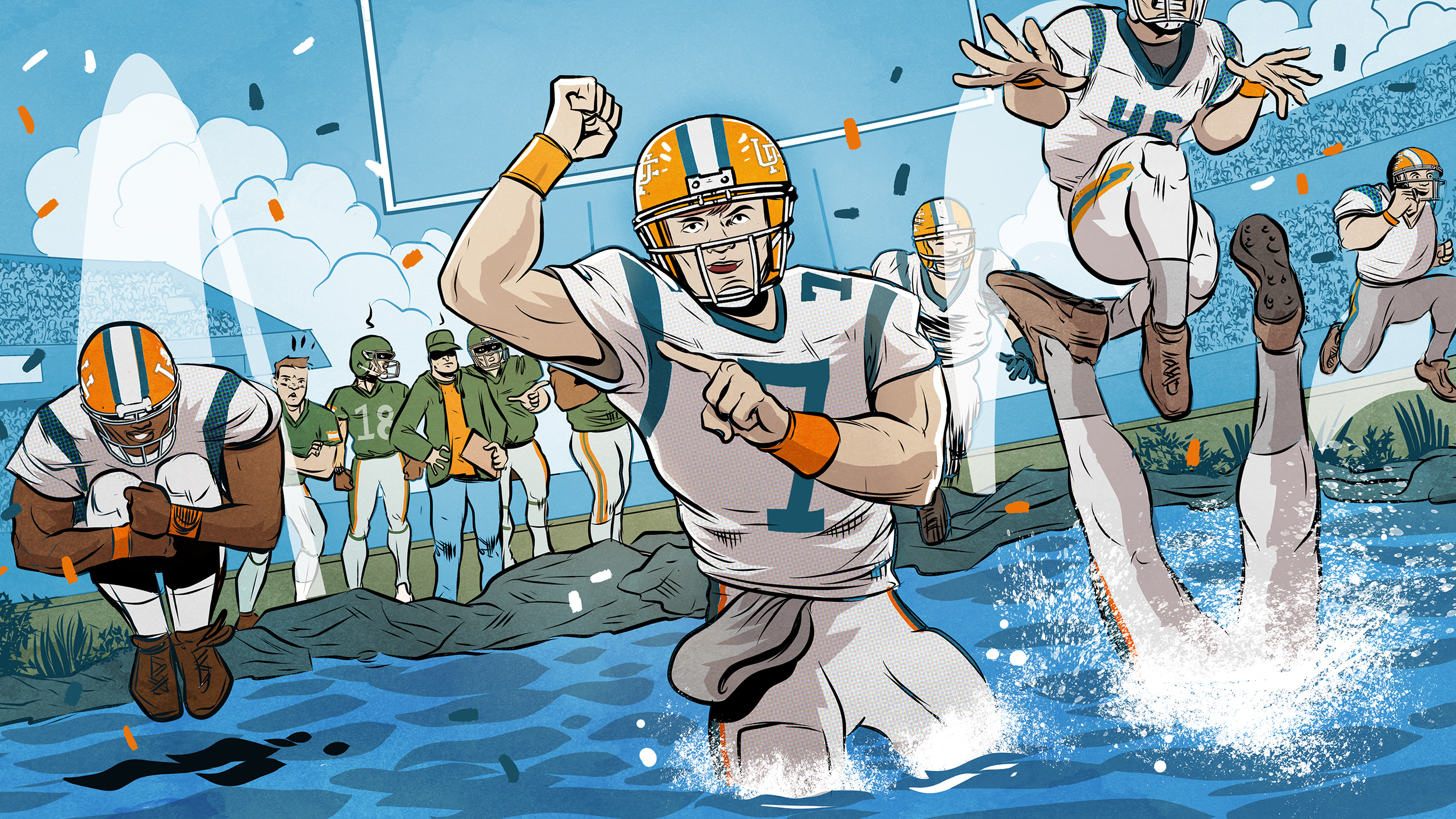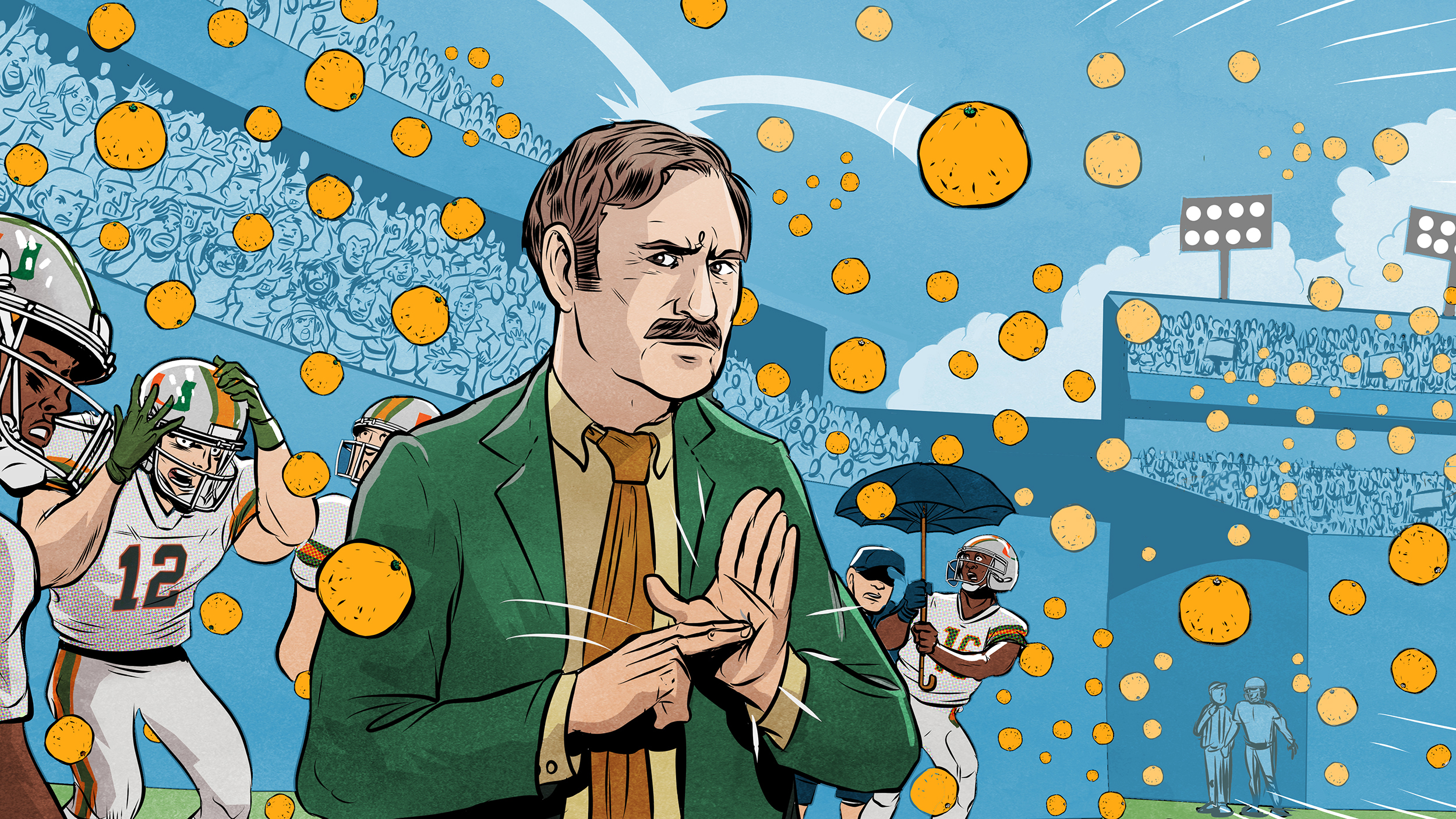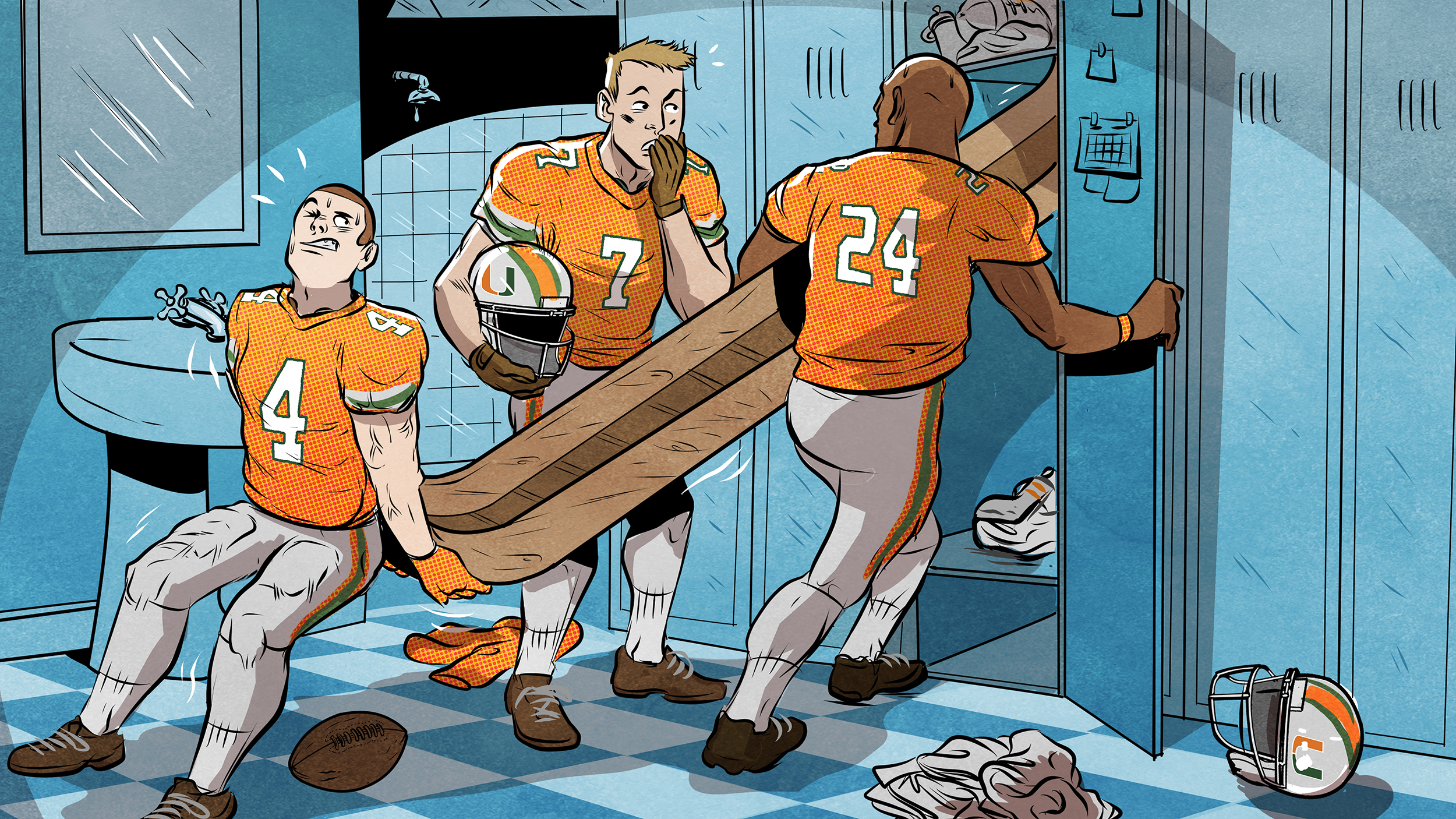Miami and No. 8 Florida meet Saturday (7 p.m. ET, ESPN) for the first time since 2013 to kick off the 150th season of college football.
Though it might be hard to remember, Miami vs. Florida used to be the biggest, and only, in-state rivalry. The teams played every year between 1944 and 1987, until Florida decided to stop playing the game annually — a move that still irks Miami fans. As soon as their rivalry stopped, the Miami-Florida State and Florida State-Florida matchups filled the void and grew in intensity as all three programs rose to prominence and often played with championship stakes on the line.
When the rivalry was held annually, the two teams played for a trophy called the Seminole War Canoe, an actual canoe hand-carved out of a 200-year-old cypress tree. It currently resides at the University of Miami Sports Hall of Fame, and there are no plans for it to go anywhere. Miami says the trophy was intended to be awarded only to the annual rivalry game winner, and since this is no longer an annual rivalry game, the canoe stays in Miami. The Hurricanes won the final annual meeting with the Gators 31-4 in 1987.
With the renewal of their rivalry upon us, here is a look back at the five most memorable moments in the history of the Miami-Florida game.

1971: The Gator Flop, and a dip in the dolphin pool
Florida quarterback John Reaves needed 10 yards to break Jim Plunkett’s NCAA career passing record of 7,544 yards. With the game winding down and the Gators leading 45-8, Miami had the ball and was driving down the field. Florida used its timeouts, and it was at this time Harvin Clark approached coach Doug Dickey and asked if they should let Miami score so Reaves could get the ball back. Finally, Dickey agreed — but he had no idea what Harvin had in mind.
Harvin told ESPN in 2010, “So I went back in the huddle and said, ‘Here’s what we need to do. We have to get John back in the game. So when they hike the ball, I just want everyone to fall on the ground.’ And I remember John Clifford, our free safety, saying, ‘What? We have to play these guys next year.’ And I said, ‘Come on now, John. I’m the captain, and this is what we’re gonna do.'”
So the Gator Flop came to be, as nearly every player on the Gators’ defense fell onto the field, allowing Miami quarterback John Hornibrook to score an easy touchdown, giving the ball back to the Florida offense. Reaves set the record on a 15-yard pass to Carlos Alvarez as time expired. Miami coach Fran Curci was so incensed, he called it “the worst thing I have ever seen in football.” He refused to shake Dickey’s hand afterward. To celebrate, several Gators jumped into the dolphin pool in the east end zone of the Orange Bowl, home to the Miami Dolphins’ actual mascot, Flipper. (Flipper was not in the pool at the time.)

1980 (and 2008!): Flying oranges and last-second field goals
That was not the last time these teams had issues running out the clock. In 1980, Florida fans started pelting Miami players with oranges after a late touchdown gave the Hurricanes a 28-7 lead. Then-Miami coach Howard Schnellenberger decided to do something about it. He called a last-minute timeout so he could add a field goal to the final score with 1 second remaining. Miami won 31-7. Schnellenberger said afterward, “I did that because I wanted the press to come and ask me why I kicked the field goal.”
It took 28 years, but Urban Meyer returned the favor in 2008. Rather than take a knee with 25 seconds left in a blowout, Florida kicked a field goal to make it 26-3. Miami coach Randy Shannon briskly walked past Meyer and in his postgame comments said, “I’ll just say this one statement. Sometimes when you do things, and people see what type of person you really are, you turn a lot of people off. Now, whatever you want to get out of that, I won’t say it again. But it helped us. It helped us more than you’ll ever know.”
1984: Kosar magic
The 1984 Florida-Miami game was one of the first televised on ESPN, and it ranks as one of the best games in the series. The teams met at the old Tampa Stadium in front of more than 72,000 fans. It appeared as if Florida might pull the upset on the defending national champions. The Gators led 20-19 with 41 seconds remaining, but then Bernie Kosar delivered one of the most memorable plays in Miami history. He led Miami 72 yards in only 29 seconds, capped off by a 12-yard touchdown pass to Eddie Brown in the corner of the end zone with 7 seconds left, to go up 26-20. Florida’s last pass went for a pick-six and Miami won 32-20, giving the Hurricanes possession of the vaunted Seminole War Canoe. It was Miami’s 13th consecutive victory, and first under new coach Jimmy Johnson, though the Hurricanes would lose the following week to Michigan. As for Florida, it was the Gators’ only loss that season, but the year was marred by NCAA violations that forced the resignation of coach Charley Pell and led to Florida vacating its SEC championship.

2000: Bourbon Street brawl
Miami and Florida were set to meet in New Orleans for the 2001 Sugar Bowl. What could possibly go wrong? In the first game between the schools since their series ended in 1987, nostalgia was high — but so were tensions. Days before the game, Miami and Florida players encountered each other on Bourbon Street just past 11 p.m. Predictably, it did not end well. Approximately 10-15 players from the two teams got into a verbal altercation. Who started the fight remains unclear to this day, since both sides gave differing accounts to their coaches and police. Soon, the fight spilled over to a nearby pizza restaurant, where one person involved in the fight fell through a window. The owner of the pizza place told the South Florida Sun-Sentinel at the time, “If somebody in here had been in the way, they would have been trampled. It was a bunch of guys, fighting each other, running around and chasing each other. There were so many of them.”
Florida linebacker Alex Brown had a swollen left eye at media availability the following day. Brown said he didn’t know who hit him, but said, “I wish I knew who did it. I’d kill him.” Incredibly, no players were suspended as coaches Butch Davis and Steve Spurrier played it off as a “minor verbal confrontation.” Miami beat Florida 37-20 in the actual game, setting the stage for its epic 2001 championship team. Years later, Miami tight end Jeremy Shockey said in the 30 for 30 documentary “The U Part 2” that Spurrier told him after the game, “You guys definitely deserved it. We got our ass beat off the field and on.” Spurrier vehemently denied this, saying after the film came out, “They never called me and said, ‘Did you say that?’ But that’s not the first time in life somebody put a quote on me that I didn’t say. I did say most of them, but not that one.”
2003: Brock Berlin’s revenge
This one still makes Florida fans nauseous. Brock Berlin, one of the most highly touted quarterbacks coming out of high school in Louisiana, chose to sign with Spurrier and Florida. But after Spurrier left for the Redskins and Ron Zook became the head coach, Berlin decided to transfer to … Miami, a personal affront to Gators fans everywhere. He earned a permanent place in the rivalry after his career-best day against the Gators.
“It was a very emotional week leading into that game,” Berlin recalled in a recent phone interview with ESPN. “No. 1, it was my first start in the Orange Bowl, so there was a lot of emotion with that in itself, but to be able to play against my former teammates at Florida made it even better.”
Florida took a 33-10 lead into the third quarter, but Berlin saw a spark in his teammates after he threw a 26-yard touchdown pass to Kevin Beard with four minutes left in the third quarter. Then just before the third quarter ended, Miami scored again. “We got into a rhythm. We gained momentum,” Berlin said. “For me, it was one of those out-of-body experiences. You knew we’re not walking out of here without a win.”
Berlin battled cramps in the fourth quarter but refused to let it deter him, and Miami kept rolling — scoring 28 unanswered points to win 38-33. To celebrate, he did the Gator chomp in front of the Florida section. “You can’t dream up that scenario,” Berlin said. “You can’t dream up the way that game played out.”
Credit: Source link